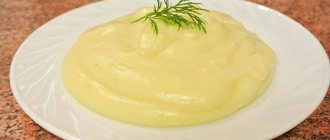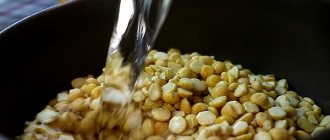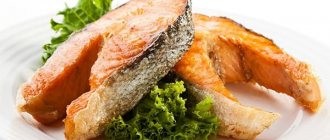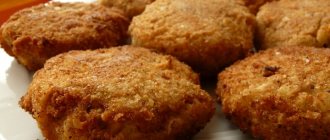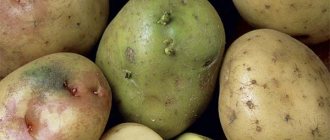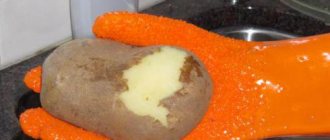More potatoes
Balance the taste of the prepared mashed potatoes with an additional portion of boiled potatoes. In this case, the vegetable is chopped into small pieces, boiled until tender and ground into puree. No need to salt! Just mix fresh puree with salted one.
Tip: While you cook the second portion of mashed potatoes, wrap the first portion with a towel so that the potatoes do not cool down.
What to do if you oversalt your fried potatoes: tips
Potatoes are a salt absorbent in themselves. Usually it is used to get rid of excess saltiness in dishes. Therefore, the answer suggests itself. What to do if you over-salt your fried potatoes:
- Add a new potato, cutting it in half. Cook the dish until done, and remove the halves that have absorbed salt.
- If possible and necessary, then prepare separately half of a new portion of fried potatoes, but without salt. At the end, simply mix both dishes.
- Beat 1-2 eggs, and if the fried potatoes are too salty, pour in a little more milk. Pour the “omelet” over the potatoes, stir and lightly fry for another 2-3 minutes, stirring the contents occasionally.
- Add more onion - it dulls the salt.
- Greens also neutralize salt well which goes well with fried potatoes. For example, dill, parsley, green onions and garlic. It should be added at the end of cooking.
- Unsalted mushrooms or minced chicken (you can use another product) will take on some of the salt. As a result, you will also get a hearty dish with moderate saltiness.
- Additionally, use vegetables that will draw out the salt. For example, zucchini, eggplant, tomatoes, bell peppers, etc. Cut into arbitrary medium-sized pieces.
- Make sour cream sauce. For example, mix 100 g of sour cream with 100 ml of water, add chopped garlic (2-3 cloves). Pour it over the potatoes and simmer for about 4-5 minutes. Drain the first sauce; if the potatoes are still too salty, repeat the procedure.
- Use tomato juice or paste (we dilute it in water). Simmer the potatoes in tomato sauce for about 3-4 minutes, drain the excess liquid, and repeat the procedure if necessary.
Other vegetables and foods will absorb salt well
"Silk" road
If you don't have time to boil a new batch of potatoes or vegetables, add melted butter and milk to the puree. You need 2-3 tablespoons of milk, about 50 grams of butter. Due to the liquid components, the puree will become more airy and acquire a silky consistency. A pleasant creamy flavor balances out the excessive saltiness.
How to fix over-salted boiled potatoes or mashed potatoes?
boiled , over-salted potatoes - just boil them again for a few minutes in fresh water - the excess salt will go away. But saving the puree is a little more difficult, but possible:
- Boil some unleavened potatoes separately, grind them into puree and add them to the over-salted dish. Mix everything thoroughly with a masher to distribute the salt evenly. Usually 2-3 tubers are enough, but if the salting is very strong, then the portion needs to be doubled.
- Add more oil - it not only makes the puree tender, but also dulls the salt a little.
- Pour in a little more milk or sour cream. Dairy products neutralize the saltiness well and make the puree tastier. But be careful - the dish will spoil faster with sour cream, so this option is suitable for a small portion that can be eaten at a time.
- Beat the egg, but only into the still very hot puree. Mix quickly and thoroughly to distribute the egg evenly.
- Serve the side dish with unleavened sauce and a salad of unsalted vegetables. Sour cream and mushroom is a great sauce for mashed potatoes. To prepare it, just fry onions, carrots and any mushrooms until golden brown and moisture evaporates, add a small amount of water and sour cream, and cook until thick. For flavor, you can add garlic, and to thicken the gravy, add a little flour, after dissolving it in water.
You will also be interested in our following articles on the topic:
- The best sour cream sauce recipes
- Mushroom sauce: delicious recipes
- What to do if you over-salt your kebab?
- How to fix over-salted goulash?
- What can you make from leftover puree?
This is no longer puree - and okay!
These are dumplings with potatoes.
And not oversalted at all! Over-salted mashed potatoes are perfect as a filling for pies and dumplings. It can be mixed with cottage cheese, buckwheat, eggs, stewed cabbage and used as a filling.
Or make dumplings from over-salted puree. Sprinkle them with fresh herbs, fried onions and serve.
How to save over-salted mashed potatoes
Measures to save puree:
Additional portion
Boil the potatoes without salt and put them under pressure. The spoiled puree is combined with fresh puree and mixed. It is important that the potatoes, which are cooked first, remain hot.
Color change
To get a bright, healthy dish, add whipped boiled vegetables to the salted puree - carrots, pumpkin, zucchini, spinach, seaweed.
More oil
There is no time to cook an extra portion of tubers or vegetables - no problem. Melted butter (50 g) and half a glass of warm milk will correct the situation. After introducing these products, the dish becomes richer and more nutritious. The creaminess of the rejuvenated potatoes masks the over-salting.
Using gravy with fermented milk products
Prepare sour cream, milk or yogurt sauce without salt and serve with mashed potatoes.
It is important to know!
Adding sugar does not save the dish, but rather emphasizes the taste of salt.
Video:
39 ways to cook potatoes Expand
How to avoid oversalting
Rather than redoing what has already been done, it is easier to prevent this from happening - that is, always be attentive to the process of adding salt to the dish and follow simple rules:
- Always under-salt the dish a little - you can add more salt later, when the dish is almost ready. This can be done even while eating - remember, there are always salt shakers in canteens for these purposes.
- For one kilogram of minced meat or fish, two level teaspoons of salt are required.
- When kneading dough, take one small heaped teaspoon of salt per kilogram of flour.
- To prepare crumbly buckwheat porridge, take 2 level teaspoons of salt per half a kilogram of raw cereal.
- It is better to salt all dishes at the end of cooking, the only exceptions being boiled potatoes and fish soup.
What to do if a dish is too salty
It’s not difficult to over-salt a soup, meat dish or porridge: just one awkward movement of your hand is enough. But fixing the resulting problem is much more difficult. How can you save over-salted food? What to do if a particular dish is too salty? Let's find out more about this right now.
It is almost impossible to eat over-salted food, but simply throwing away food that took a lot of time, effort and money to prepare is not the best solution. ’s much better to try to save the dish
, especially since there are quite a lot of ways to do this. The methods of “rescue” will depend on which particular dish turned out to be over-salted.
What to do if the soup is too salty?
If you oversalted the soup
, then you can choose the simplest way - dilute it with clean boiled water. However, depending on the degree of salting, you may need quite a lot of water, and this will not change the taste of the soup for the better. In addition, adding water may make the soup cloudy.
In this regard, it is recommended not to dilute salted soup with water, but to add various salt “absorbers” to it, which will help reduce the salinity of the soup. For example, you can put a gauze bag filled with rice into your soup
: Cook the rice in the soup until done and remove. The rice will absorb excess salt.
Related article: Can nursing mothers eat potatoes: boiled, fried, stewed?
Another popular “salt absorber” for soup is raw potatoes.
. Dip a few raw potatoes into the soup and simmer for 5-10 minutes. Be careful not to overcook the potatoes, otherwise your soup may become cloudy. Less effective than potatoes and rice, but still quite effective, noodles, so you can try to save your over-salted soup with its help.
What to do if a meat or fish dish is too salty?
If you are unlucky enough to over-salt a meat or fish dish
, then the situation is more complicated. You can try to remedy the situation by preparing some unsalted sauce or side dish of your choice. You can also add some tomatoes, herbs or lemon juice to the meat or dish - these products tend to somewhat neutralize the salty taste of food.
To correct the taste of an overly salty meat or fish dish, you can also try stewing this dish with unsalted vegetables
. Vegetables will “take up” the excess salt, and the dish will acquire a normal taste. Alternatively, you can use over-salted meat or fish to fill the pies, again adding unsalted vegetables.
What to do if the side dish is too salty?
If you oversalt your porridge
, the following trick will come to your aid. Rinse cereal porridge, for example, rice or buckwheat, several times with cold water and let the liquid drain. Return the porridge to the pan, add a little boiled water and butter. Place on low heat and simmer, covered, until the water has evaporated. Your porridge should now be less salty.
Over-salted vegetables, boiled whole as a side dish
, you can save it if you drain the water in which they were boiled and instead pour fresh (boiled) water into the pan. Boil the vegetables for a few minutes after boiling, then turn off the heat and leave for 10-15 minutes. Excess salt will “go” into the water.
If your mashed potatoes
(or puree from other vegetables), then you can try several ways to correct the situation. For example, add milk and butter to the puree, or simply mix your salted puree with a portion of unsalted puree. Of course, in the latter case, the unsalted puree will have to be cooked separately.
Fried potatoes on the side
It can also be saved by adding unsalted potatoes to it. You can also try adding herbs and sour cream to the potatoes - this will reduce the salty taste.
As you can see, almost any over-salted dish can be corrected if you use some culinary tricks. However, as you know, any problem is always easier to prevent than to solve, and therefore try to salt dishes at the end of cooking, add salt little by little and be sure to take into account the initial saltiness of the products used.
Sources:
https://onwomen.ru/kartoshka-peresolena.html https://delafe.ru/page/esli-peresolila-kartoshku-kak-vse-ispravit https://m.baby.ru/blogs/post/335854396- 335040762/
Ideal technologies for preparing minced meat for cutlets
Meat
How to store potatoes in the refrigerator and is it possible to do so?
Ingredients:
- beef – 500 g;
- pork – 200 g;
- onion – 1 pc.;
- eggs - 2 yolks;
- spices, salt - to taste.
Preparation:
- Grind the meat in a meat grinder or blender. Fine grinding will give future cutlets a delicate texture.
- Knead the minced meat thoroughly, allowing it to saturate with oxygen. This will make it fluffy and soft, which will affect the taste of the future dish.
- Fry the onion until light golden brown, add it to the minced meat along with the egg yolks. Knead thoroughly.
- Lastly, spices and salt are added to the minced meat. As spices you can take black pepper, rosemary, basil, paprika.
- To avoid having to correct over-salted minced meat, add salt at the rate of 1 tsp. per 1 kg of meat.
- Before cooking, place the thoroughly mixed minced meat in the refrigerator for at least half an hour so that it is saturated with the taste and aroma of spices.
Fish
Ingredients:
- cod fillet – 700g;
- onion – 1 pc.;
- eggs – 2 pcs.;
- dry oat flakes – 50g;
- lemon juice – 1 tsp.
- salt, pepper - to taste.
Preparation:
- Grind the cod along with the onion.
- Add cereal, lemon juice. Knead and leave for 15 minutes so that the oatmeal has time to disperse.
- Boil the eggs hard, chop them finely and add to the minced meat.
- Mix the minced meat thoroughly, add salt and pepper to taste.
8. Recycle Over-Salted Foods
So, from over-salted meat or fish, you can prepare a delicious, hearty pie filling by adding additional ingredients (vegetables, cereals). Over-salted vegetables can be processed into puree by adding pureed vegetables boiled without salt.
There is only half an hour left before the guests arrive, and having dressed up, you quickly try the salad prepared according to a long-proven recipe, but suddenly you realize that the dish is too salty... Tragedy? Catastrophe? Nothing like this! In no case should you panic, because food that seemed hopelessly spoiled can easily become not only edible again, but also surprisingly tasty. To fix everything, you just need to enlist the support of experienced chefs who will offer you simple tips, some of which are presented below.
What to do if you over-salted the soup?
It is known that even the most aromatic and richly flavored soup can lose its invaluable qualities if it is over-salted. However, in the case of this particular dish, there are three ways to cope with the problem.
1. Sugar is the best enemy of salt.
The simplest thing you can do is add a pinch of sugar to over-salted soup. No matter how strange it may look, it is sugar that can most quickly cope with the problem that has arisen, being a contrasting flavoring substance that can not only eliminate excess salt, but also enhance your taste sensations when eating the saved soup.
2. More liquid!
Another method, also widely used by cooks, is no less simple: you need to add unsalted broth or just boiled water to the soup. The best option, of course, would be broth, and not because adding it may just seem more natural, but for the reason that it is the broth that will mix with the other ingredients in a matter of minutes and you will immediately understand whether you need to continue adding to the soup liquid, or it no longer seems over-salted. Unlike broth, it will take some time for the soup to mix properly, and it is quite possible that after adding water and tasting the soup again, you will not notice any difference and decide to continue adding more. But in fact, you should just wait and only then take the sample. It is possible that much water will not be required.
Of course, this option is unlikely to suit those of us who like to fill the pot with soup to the very brim.
3. Potatoes, but not as an ingredient.
This third option, no less effective and simple, will suit everyone. The method is to peel a raw potato and place it in the soup. Keep the potatoes in the soup for as long as possible, until the time comes to pour it into plates. Potatoes will perfectly absorb excess salt.
What to do if you over-salt your mashed potatoes?
Of course, the simplest solution to this problem would be to add some more unsalted boiled potatoes, mashed into a puree, but if you don’t have the opportunity to increase the amount of the prepared dish, then unsalted butter will help you.
Most of us prefer to eat mashed potatoes with a piece of butter added to it, but few people know that this product not only makes the mashed potatoes more tender and thick in consistency, but also muffles the feeling of salty taste in it.
What to do if you over-salt the rice?
In this case, the best thing you can do is to rinse the rice with as much cold water as possible. The colder the water, the more effective this rinsing will be. Washed rice will become more attractive in appearance and fluffy, and at the same time will lose excess salt.
What to do if you over-salted porridge, buckwheat and other cereals?
If the porridge was cooked in milk, you can get rid of the problem very simply: just add a little more milk - and the problem is solved! But if we are talking about non-dairy porridges, or any other cooked cereal, such as buckwheat, then the best solution would be to use potatoes.
Unlike the measures taken in the case of over-salted soup, to eradicate this problem, you should cut the raw potatoes into large cubes. Only then will she be able to properly absorb the excess salt from the cooked cereal, which differs from the soup in being much thicker. When, after tasting the porridge, you are convinced that it is edible, simply remove the potato pieces from it and throw them away as unnecessary.
What to do if you over-salted meat, chicken or fish?
Undoubtedly, the case of over-salted meat is one of the most difficult, and most likely we will have no choice but to sacrifice the taste of the dish in order to save it from the trash can. You should remove the pieces of meat from the vessel in which they were stewed, remove them from the frying pan or from the baking sheet, and then rinse them with cold water and keep them on the fire for some more time. This is the only way to get rid of the feeling that the dish is too salty.
In the case of slightly over-salted fish that has been grilled, lemon can often help a lot. Pour lemon juice over the fish and enjoy its rich taste, forgetting about excess salt.
What to do if you over-salted the cutlets?
In such a situation, you can advise adding some kind of sauce to the cutlets, which would somehow brighten up their eating, and you can also use various herbs and spices, such as oregano, celery, dill, pepper, basil, cumin.
What to do if the salad is too salty?
The simplest solution is to double the amount of ingredients used. If for some reason this is not possible, then it makes sense to add onions and celery to the salad. It is these products, thanks to their texture and taste, that can overcome excess salt in any salad. A little lemon juice will also help, as will spicy ingredients like cayenne or mustard.
When to salt potatoes
General recommendations
The moment of adding seasoning to potatoes depends on the type of salt, method of preparation, and the desired consistency of the product.
Popular rock salt is used to season dishes at any stage of cooking. Finely ground crystals are used in smaller quantities. Sea salt, like iodized salt, is enriched with additional minerals. These types of seasonings are added to the tubers 3 minutes before the end of cooking or after it, so that no foreign taste arises.
A cooking mistake is easier to prevent than to correct. To prevent oversalting, listen to the advice of chefs:
- Salt purchased for the first time should be used with caution.
- In order not to spoil the taste, dishes are tasted after adding seasonings and spices.
- You can accurately assess the salinity of cooked potatoes only after they have cooled.
Important!
It’s better to under-salt the potatoes a little, because there is always a salt shaker on the table.
Peeled boiled
There are several options for adding seasoning to peeled tubers when cooking:
- Into cold water. If you salt the potatoes at the beginning of cooking, they will become watery.
- After boiling. The vegetable will boil less than in the first case.
- Five 5 minutes after boiling. The potatoes will not fall apart and will remain dense.
- After cooking. The tubers retain their aroma and taste if, after cooking, drain the water, add butter, chopped fresh dill, and salt into the pan. Cover the container with a lid, shake the contents, and leave for 5 minutes so that the salt has time to dissolve.
- When serving. The potatoes are boiled without seasoning. Salt and oil are placed on the table in a separate bowl.
Mashed potatoes
Professionals do not recommend cooking mashed potatoes on low or high heat, salting them in cold water, immediately after boiling or while kneading.
A tasty, tender puree is obtained if you add salt 7-10 minutes after boiling, crush the tubers with a wooden masher rather than a blender, add warm milk, butter at room temperature.
We recommend reading:
What to do if you oversalt your food?
How to save a dish Read
Jacket potatoes
Served as a separate dish, but more often added to salads, fillings for pies, pies. During the cooking process, potatoes are not salted in order to preserve the aroma and taste of the vegetable.
Fried potatoes
Potatoes seasoned with salt at the beginning of frying do not develop a crispy crust and the cooking time increases. Slices and cubes of tubers, salted at the last moment, remain fresh inside.
The best option is to use the seasoning 15 minutes before the end of frying.
Stewed potatoes
The tubers are not salted separately, as they are stewed over low heat in an already seasoned sauce. If 10 minutes before cooking is found to be under-salted, add sodium chloride to taste.
Steamed potatoes
Steamed tubers retain their flavor if they are seasoned with salt and ground black pepper when serving. New potatoes will be more flavorful if they are steamed with their skins.
6. Add absorbent product
Some products have beneficial absorbent properties, e.g. able to absorb excess salt. Such products include potatoes, starchy cereals, pasta, and fresh herbs. So, in an over-salted soup, you can put a few chopped potatoes or add 100-150 g of rice - these ingredients will absorb excess salt. If you don’t want to spoil the dish with extra food, you can put the potatoes in whole so that they can be easily taken out later, and place the cereals in the soup in a fabric bag.
How to remove excess salt from boiled potatoes
- If the water in which the peeled tubers are boiled is too salty, drain it and continue cooking by filling the pan with water without seasoning.
- Boiled potatoes are poured with water, brought to a boil and removed from the pan. Serve with herbs, chopped fresh vegetables or unsalted salad.
- Remove the salt by simmering boiled tubers cut into slices with sour cream or tomato sauce for 20 minutes under a closed lid.
- Sweet and sour tomato sauce masks the taste of even heavily salted potatoes. When preparing it, onions are fried with carrots and sweet peppers, crushed tomatoes or paste are added, and diluted with water. Cinnamon, hot pepper, and nutmeg add piquancy to the dish.
How to avoid oversalting
Rather than redoing what has already been done, it is easier to prevent this from happening - that is, always be attentive to the process of adding salt to the dish and follow simple rules:
- Always under-salt the dish a little - you can add more salt later, when the dish is almost ready. This can be done even while eating - remember, there are always salt shakers in canteens for these purposes.
- For one kilogram of minced meat or fish, two level teaspoons of salt are required.
- When kneading dough, take one small heaped teaspoon of salt per kilogram of flour.
- To prepare crumbly buckwheat porridge, take 2 level teaspoons of salt per half a kilogram of raw cereal.
- It is better to salt all dishes at the end of cooking, the only exceptions being boiled potatoes and fish soup.
How not to over-salt potatoes
People say: if a woman over-salts a dish, it means she is in love. There is some truth in this saying: the thoughts of a person in love are far from cooking. People whose attention is distracted often add excessive amounts of salt and seasonings to food without looking. Before salting a dish, you need to focus on the taste sensations, preferably turn off the TV.
To someone who has already eaten something salty, subsequent food seems more bland. Potatoes are most often over-salted by adding salt after the first or second test. To avoid such trouble, before trying the dish, be sure to drink one or two sips of water.
It should also be taken into account that many manufacturers include salt or monosodium glutamate in the composition of ready-made spicy mixtures. Therefore, food is first seasoned with spices and then with salt.
It’s a good habit to add a little less salt to your food during cooking. Then each of those sitting at the table salts the food to taste.
How?
So we come to the question that worries everyone: how to properly use brine so that the meat turns out juicy and tender, and not over-salted and over-dried?
Strictly speaking, the simplest brine is made from water and table salt, although if desired, sugar can be added to them (it also promotes diffusion, although to a lesser extent than salt) and spices (although the effect of their use will not be as noticeable as in the case of classic marinating). Salt is added to cold water, stirred until dissolved, after which the product is completely immersed in it and put in the refrigerator. The universal brine formula is as follows:
Keep the products completely immersed in brine for 1 hour for every half a kilogram of product weight, but not less than 30 minutes and no more than 8 hours. When brining small pieces of meat, be guided by the weight of each of them: for example, if you put 6 chicken drumsticks weighing 250 g each in the brine, you need to remove them from the brine after half an hour. If you are brining a whole chicken, it is better to put it in a thick plastic bag and fill it with brine, which will significantly reduce its amount. And don’t forget to wash off the salt that has settled on the surface of the food - in this case, the meat will be juicy, but in no case over-salted.
Now let’s talk about which products can and should be tested with brine before cooking. These include:
- white meat
- chicken, turkey, lean cuts of pork, in short, everything that needs to be cooked for a long time and can easily dry out. - fish
- absolutely any fish, especially those that you are going to cook at high temperatures (for example, on the grill) or smoke. - seafood
- especially shrimp, and in general anything that is usually grilled.
On the other hand, products such as beef, lamb, duck, game and so on do not benefit from aging in brine. There are several explanations for this. First, they are usually not cooked to anything more than medium, so the internal temperature of cooked beef will be lower than that of cooked chicken, meaning there will be much less moisture loss during cooking. Secondly, this meat itself is fattier and will turn out juicy in a completely natural way.
Most often, in response to complaints about tough meat, you hear: “”. Of course, you can’t argue with Captain Obvious...
But what to do, and not always what you dreamed of? Or, even worse, a piece of the same beef looks great. Then we use a few tricks that will help overcome the toughness and make our dish juicy, soft and expressive.
There are only two ways to soften meat before cooking: coating and marinating. I’m not talking about beating a piece of meat with a hammer - that’s not sporting.
